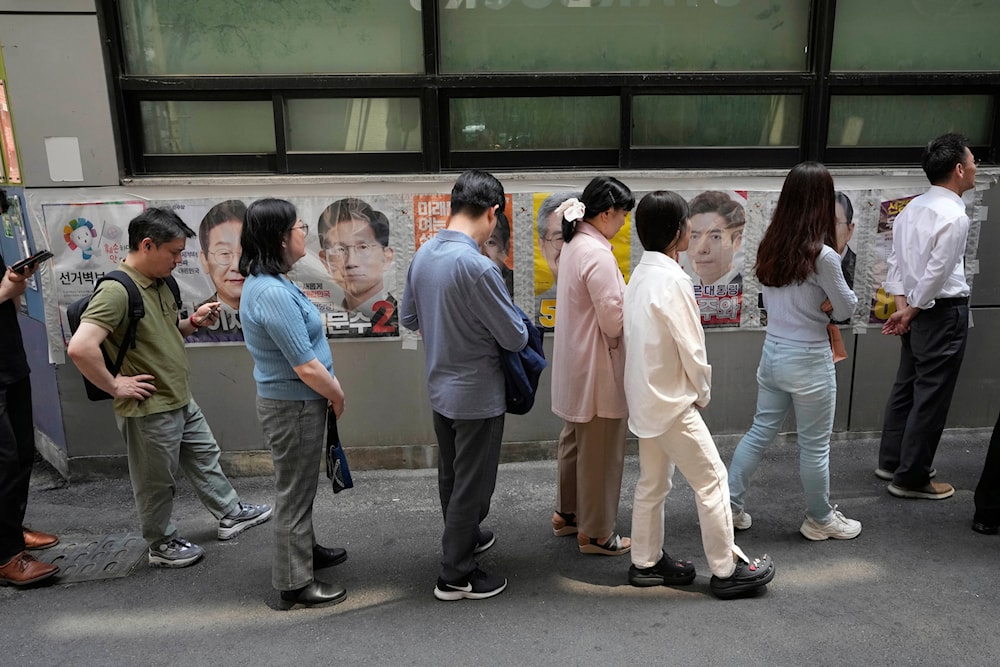South Korea kicks off high-stakes 2025 presidential election
Liberal candidate Lee Jae-myung leads polls amid political fallout from Yoon Suk Yeol’s impeachment and martial law crisis.
-

People wait in line by posters of presidential candidates as they wait to cast their early votes for the June 3 presidential election near a polling station in Seoul, South Korea, Thursday, May 29, 2025. (AP)
South Korea has begun early voting for its 2025 presidential election, with both leading candidates, liberal Lee Jae-myung and conservative Kim Moon-soo, casting their ballots on Thursday. The election marks a pivotal moment following former President Yoon Suk Yeol’s controversial imposition of martial law last year, which led to months of unrest and his eventual impeachment.
Amid the fallout from Yoon’s suspension of civilian rule, South Koreans are eager to restore political stability. The country has been governed by a series of acting presidents since the crisis, all while grappling with trade pressures and declining domestic demand in its export-reliant economy.
According to the National Election Commission in Seoul, early voting turnout reached a record 8.7% by midday on Thursday. The surge reflects heightened public engagement following the political upheaval of 2024. Overseas participation has also been notable, with four-fifths of the 1.97 million eligible voters abroad casting ballots, an unprecedented figure.
In the 2022 presidential contest, 37% of the electorate voted early, a trend that continues to gain traction in South Korean elections. This year, early voting is available on Thursday and Friday, ahead of the main voting day on June 3.
Lee Jae-myung leads polls against Conservative rival Kim Moon-soo
Liberal candidate Lee Jae-myung holds a commanding lead in recent polling. A Gallup Korea survey shows that 49% of respondents consider him the best candidate. His rival, Kim Moon-soo of the ruling People Power Party, trails with 35% support.
During his appearance in Seoul on Thursday, Lee underscored the significance of democratic participation, stating, "There's a saying that a vote is more powerful than a bullet."
He added, "Even an insurrection can only truly be overcome through the people's participation at the ballot box."
Gallup’s data indicate that over half of Lee’s supporters plan to vote early, in contrast to just 16% of Kim’s base.
Kim, who cast his vote in Incheon, described his campaign as "the beginning of a dramatic turnaround," referencing General Douglas MacArthur’s historic landing during the Korean War. Addressing concerns raised by conservative circles over potential fraud, Kim reassured voters that "there is nothing to worry about," and emphasized his party's efforts to ensure transparent oversight.
"If you hesitate to vote early and end up missing the main election, it would be a major loss," he warned.
Fallout from Yoon Suk Yeol’s impeachment still reverberates
The 2025 election takes place under the shadow of Yoon Suk Yeol’s impeachment, which followed his imposition of martial law. His decision to suspend civilian rule sparked widespread protests and a political crisis that gripped the country for months.
Kim Moon-soo, a former labor minister and Yoon ally, gained national attention during the crisis by refusing to denounce the suspension of civilian authority. In contrast, Lee Jae-myung rose in prominence after his dramatic intervention in parliament to block efforts to extend martial law. He later vowed to "bring insurrection elements to justice" if elected.
Political science professor Kang Joo-hyun of Sookmyung Women’s University commented on the atmosphere surrounding the vote,
"Given that this election was held in the wake of an impeachment and a martial law crisis, it naturally reflects the public's strong desire to express their thoughts about democracy in South Korea."
Regardless of who prevails, the next president will confront several urgent challenges. These include steering South Korea through a deepening economic downturn, addressing one of the world’s lowest birth rates, and curbing the rising cost of living.
Additionally, the new administration must navigate a delicate foreign policy landscape, balancing security ties with the United States and growing economic dependence on China, its largest trading partner.

 4 Min Read
4 Min Read









